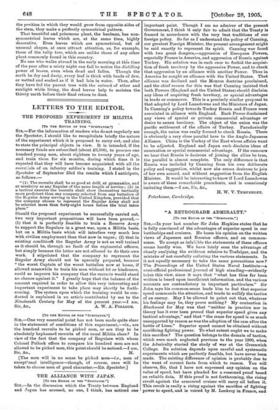important point. Though I am no admirer of the present
Government, I think it only fair to admit that the Treaty is framed in accordance with the very best traditions of our foreign policy. So far as I understand the policy of Canning, our greatest Foreign Minister, the present arrangement might be said exactly to represent its spirit. Canning was faced with two great dangers,—aggression of European Powers, especially France in America, and aggression of Russia against Turkey. His solution was in each case to forbid the acquisi- tion of fresh territory by the aggressive Power, and to check that aggression by an alliance with another Power. Thus in America be sought an alliance with the United States. That alliance was declined and the Monroe doctrine proclaimed, and the chief reason for this was that Canning insisted that both Powers (England and the United States) should disclaim any ideas of acquiring fresh territory, or special advantages in trade or commerce. This is a precisely similar proposal to that adopted by Lord Lansdowne and the Ministers of Japan. In Canning's policy towards Turkey Russia and France were associated in alliance with England. Each Power disclaimed any views of special or private commercial advantage or desire to annex territory. The object of the union was the pacific settlement of the affairs of Turkey. Paradoxically enough, the union was really formed to check Russia. There is obviously a very close parallel here to the Anglo-Japanese Alliance. China is the Turkey of the East whose affairs want to be adjusted. England and Japan each disclaim ideas of annexation or special commercial advantage. If the rumours we hear that Russia is desirous of joining the allies be true, the parallel is almost complete. The only difference is that Russia was included by Canning from his own deliberate policy and suggestion, whilst now she seems desirous to join of her own accord, and without suggestion from the English Minister. It would be interesting to know if Lord Lansdowne is aware of these remarkable precedents, and is consciously imitating them.—I am, Sir, &c., H. W. V. TEMPERLEY. Peterhouse, Cambridge.


















































 Previous page
Previous page